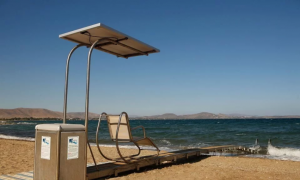“The level of a society’s interest in people who are confronted with difficulties is a measure of its civilization.” Engineer Ignatios Fotiou refers to this credo, taught to him by one of his professors at the Patras University School of Mechanical Engineering, as an inspiration for his work that resulted in the creation of the Seatrac beach ramp. The construction allows for people with mobility challenges to have autonomous access to the sea, making significant improvement to their lives.
The 38-year-old engineer came up with the idea for the ramp in 2009, when he was a graduate student and met with one of the regional prefecture councilors, Gerasimos Fessian, a disability advocate, who expressed his own need to be able to go swimming without needing assistance.
One year later, the first Seatrac mechanisms were installed in Agios Vasileios, Rio, and Akolis in Aigion. Nowadays, Seatrac ramps are used at 61 beaches in Greece, Italy, and Cyprus.
As far as social enterprises go, Seatrac plays a dual role. Not only does the mechanism make a tangible improvement to the lives of people with mobility challenges, it is also reliant on renewable energy. It is powered with a solar panel and uses rails on which a specially-designed seat moves from the beach to the sea and back, by simply pushing a button on a control panel.
A success story in its own right, Seatrac now is aiming even higher. Fotiou has entered the high-profile Chivas Venture Competition for Social Enterprises, which gives contestants the chance to win a share of one million US dollars in funding for their projects.
The venture is a global search to find and support the most promising startups with the potential to succeed financially and make a positive impact on the lives of others.
The 2018 Chivas Venture competition will see 26 startups from all over the world competing for the prize on 24 May in Amsterdam.
Source: neoskosmos
Ask me anything
Explore related questions





